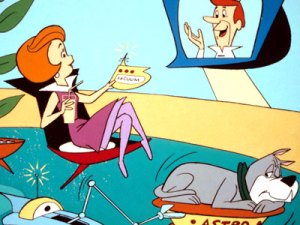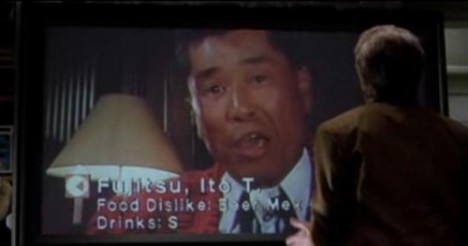Hi there!
I think Barnes & Noble started the whole thing.
Back in the old days, you just couldn’t READ in a bookstore. That was just far too dangerous. If you allow people to read a book, in a place that sells books, then what motivation would you possibly have to actually BUY one? Bookstores weren’t free. In the more dictatorial bibliographic establishments, they’d actually remind people of this:
“Hey! This ain’t a LIE-BERRY, pal!“.
But then B&N did something to change all that.
Coffee shops.
They started to include tasty beverages and sweet confections. Comfy chairs were provided. At first, some patrons were perplexed. “What are the comfy chairs for?” they’d ask. The friendly Barnes & Noble staff would inform people that yes, the chairs were for sitting. The coffee was for drinking. Patrons were allowed, nay encouraged, to sit and enjoy a caffeinated drink while reading a new book. It was a new experience for most of us.
Some people would go on to actually purchase those books that they had perused while in Barnes & Noble, and some would not. But by cultivating a more welcoming atmosphere, Barnes & Noble began to style itself as a “third space”; A place where people would go to just “hang out”. For years, this was a successful business model for them, and some other large bookselling chains began to follow suit.
So where do libraries fit in to all of this?
Libraries have always been styled as quiet places of contemplative study. Loud social behavior was never something to be tolerated in such austere institutions of self-education as these. How do you think librarians got that whole shushing reputation? But in recent years, librarians have begun to work at the cracks in our mold. We’ve begun to fight the stereotype. If bookstores are beginning to emulate the community center feel of a library, librarians have followed suit by recreating the free, shopping-mall atmosphere of a bookstore. We sell coffee and tasty treats now. We offer free wireless. We host video-game nights, film nights, and other community-driven activities. We host art and culture events that have very little to do with reading or education. Libraries are transforming right before our eyes, whether we like it or not.
Some people don’t like it. 😦
When the Kean University Library opened it’s full-scale Starbucks, there was opposition. A lot of it. Some people complained about the noise from the espresso machines disrupting the peace of the main lobby. Some complain that by introducing food into a library, we’re endangering our precious tomes with the threat of coffee stains and greasy fingerprints. Others complain that by opening up a Starbucks in our educational facility, we are exposing ourselves to corporate interests. Some librarians (such as myself) see the introduction of a Starbucks as a clear and present danger to the integrity of our waistline.
From an administrative standpoint, this Starbucks has become a shining jewel in the crown of the campus. The University President rarely hesitates to bring visitors to our coffee bean mecca. The fact that there is a library connected to the Starbucks is very nearly incidental. We seem to have become a footnote to the campus image. Tragic as this is, having a Starbucks in the building has greatly increased our foot traffic. Although some students walk directly into the store and then right out of the building again, many others stay, sip their beverage, and actually find a quiet corner to study. (away from the espresso machines)
But my question is, does this increase in foot traffic come at a price? Are we “corporatizing” our library by letting Starbucks do their business here? Is there a conflict of interests in working so closely with such a business? If someone were to write a book-length scathing expose of cafe chains, (the way that Eric Schlosser did with Fast Food Nation) would we be disinclined to carry this book?
Personally, things like noise and coffee stains don’t bother me. There are plenty of quiet spaces in our library, and after all, we let people take their books home, where they might potentially spill coffee and/or confections on them. But when people begin to wonder if libraries are giving too much corporate control to our beloved institution, I have to sit up and listen. I actually love our new Starbucks, and I have been utterly seduced by the siren song of their venti white chocolate mochas [mochae? mochii??] But has that turned me into little more than corporate shill?
The other side of the argument, of course, is that this is actually the goal. As more and more libraries get nickel-and-dimed from fiscal budgets, some librarians begin to wonder if corporate sponsorship is the way to go. Do we owe it to our patrons to partner our libraries with corporate interests, if it will help to put books on the shelves and patrons in the building? How long is it before your municipality hosts the “PNC BANK Memorial Library”, or the “Time/Warner Media Center? Is that the goal?
And it’s not like we don’t do business with private companies anyway. We all do free advertising for names like EBSCO, ProQuest, and Innovative any time someone uses a catalog. What’s one more brand name?
I’m not too sure. I’m just going to sit here and eat my red velvet whoopie pie until I figure it out. 😦

That's totally NOT an evil sneer that I see on those delicious little monsters, right? Riiiight ...??
Filed under: Uncategorized | Leave a comment »









